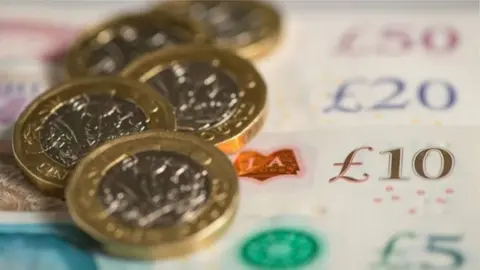Hammond’s £19bn bill to 'end austerity'
The government will have to find an extra £19bn a year if it is to uphold Theresa May's promise that "austerity is over", a major report has said.
In its pre-Budget report, the Institute for Fiscal Studies says it means higher borrowing and higher taxes.
If not, pledges to raise NHS spending by £20.5bn and "balance the books" by 2020, matching spending and taxation, were likely to be incompatible.
The Treasury said its approach was to keep taxes as low as possible.
A Treasury spokesperson said: "Our balanced approach is getting debt falling and supporting our vital public services, while keeping taxes as low as possible. This year, we have already committed an extra £20.5bn a year to the NHS, scrapped the public sector pay cap, and frozen fuel duty for the ninth year in a row."
'Incompatible offers'
"The government seems to have made two incompatible offers to the electorate," Paul Johnson, the director of the IFS, told me.
"The first is that it wants to get rid of the deficit in the next few years. And the second thing that the PM said just a couple of weeks ago is that the end of austerity is nigh.
"Well, getting rid of austerity will mean spending at least an extra £20bn or so by the end of this parliament [in 2023]. If you're going to spend an extra £20bn or so, you're not going to get rid of the deficit unless you have some big tax rises."
Mr Johnson doubted there would be any significant tax rises in the Budget in two weeks' time, as there was still a good deal of economic uncertainty over Brexit and the government would struggle to push any substantial changes through Parliament, where it lacks a majority.
"The chances of anything significant - the chances of the sort of £10bn to £20bn that might really make a difference - I think are close to zero and essentially for political and not for economic reasons," he said.
 PA
PA'Relief boost'?
In his interview with the BBC last week, Philip Hammond left the door open to tax rises, but said that any increases would be kept to "an absolute minimum" .
One policy the government is looking at is freezing tax thresholds (the amount of money working people can earn before they start paying tax), putting in jeopardy a manifesto pledge to raise the limit to £12,500 a year for lower-rate taxpayers and £50,000 a year for higher-rate taxpayers by 2020.
As the BBC revealed last week, the Chancellor is also looking at tightening up self-employment rules, so that more self-employed people pay higher levels of tax .
There is a belief in the Treasury that if there is a Brexit deal, that will give a short-term "relief boost" to the economy which will help the public finances.
Tax revenues tend to rise during periods of better economic growth and the need for benefit payments tends to reduce.
The IFS said that austerity was not yet over.
Smaller economy
Departments such as the Home Office, responsible for police services, the Justice department, responsible for prisons, and local government were facing cuts of £4bn in day-to-day spending next year.
There are also benefit cuts of £7bn to be made by 2023, the report says.
The economy is already 2% smaller than expected before the Brexit referendum, which means that the government's revenues from taxes are also lower.
Despite the prime minister's pledge that a "Brexit dividend" could be used to pay for some of the extra money for the NHS, the IFS said there was "virtually no" such dividend by 2023, as savings on contributions to the EU would be less than £1bn a year.
Extra Brexit costs - such as the need for border controls - could easily exceed that saving.
